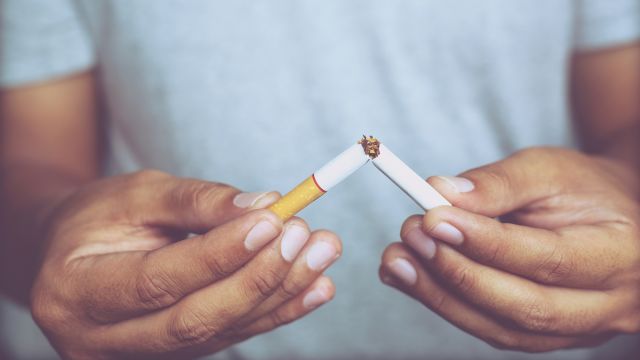Cigarette smoking significantly increases one’s risk for heart disease, stroke, COPD, various types of cancers, and other diseases and conditions. For people with human immunodeficiency virus (HIV) who smoke, the risk of many of these complications is even higher. And there are additional complications, too. Unfortunately, research shows that those with HIV smoke at twice the rate of the general population.
Putting your health first
If you’re living with HIV, quitting smoking is one of the most important things you can do for your health. Putting out your cigarette for good reduces your risk of developing the following:
- HIV-related infections. If you smoke and have HIV, you’re more likely to develop HIV-related infections including thrush (a mouth infection, also called oral candidiasis), hairy leukoplakia (white mouth sores), bacterial pneumonia, and pneumocystis pneumonia, a dangerous lung infection.
- Lung cancer. Smoking increases the risk of many cancers, including lung cancer. Lung cancer appears to occur more often in people with HIV and smokers with HIV have a further increased risk of lung cancer.
- Other cancers. People who have HIV and smoke are also at increased risk of other cancers, including head and neck cancer, cervical cancer, and anal cancer.
- Heart disease and stroke. HIV in itself may increase the risk of heart disease. And studies suggest that smoking is the main risk factor for heart disease in people with HIV. Furthermore, some anti-HIV drugs can cause increases in cholesterol, and this can contribute to cardiovascular disease. If you smoke and take certain anti-HIV drugs, your risk for heart disease is elevated even more.
- COPD. Short for chronic obstructive pulmonary disease, this serious lung disease causes severe breathing problems. Stopping smoking can help cut your risk of developing COPD.
- AIDS. Smoking can also make HIV treatment less effective, increasing a person’s chances of developing illnesses that lead to a diagnosis of AIDS (acquired immunodeficiency syndrome).
Taking steps to quit
Stopping smoking isn’t easy, but it’s one of the single best steps you can take to reduce your risk of HIV-related infections and improve your overall health. When it comes to kicking the habit, knowing your triggers and understanding the best way to address them is your first line of defense. Triggers are things that may make you want to smoke. You may tend to pick up a cigarette when you’re stressed, for example. Listening to calming music could be an alternative, and a much healthier one. Or if you’re used to lighting up after finishing a meal, you might opt for a walk around the neighborhood instead.
Along your journey, having a support system is key in helping you to stay on track. Your healthcare provider can point you toward programs, medications, and support groups to help you quit. In addition, close friends or family members can be great sources of encouragement and motivation.






